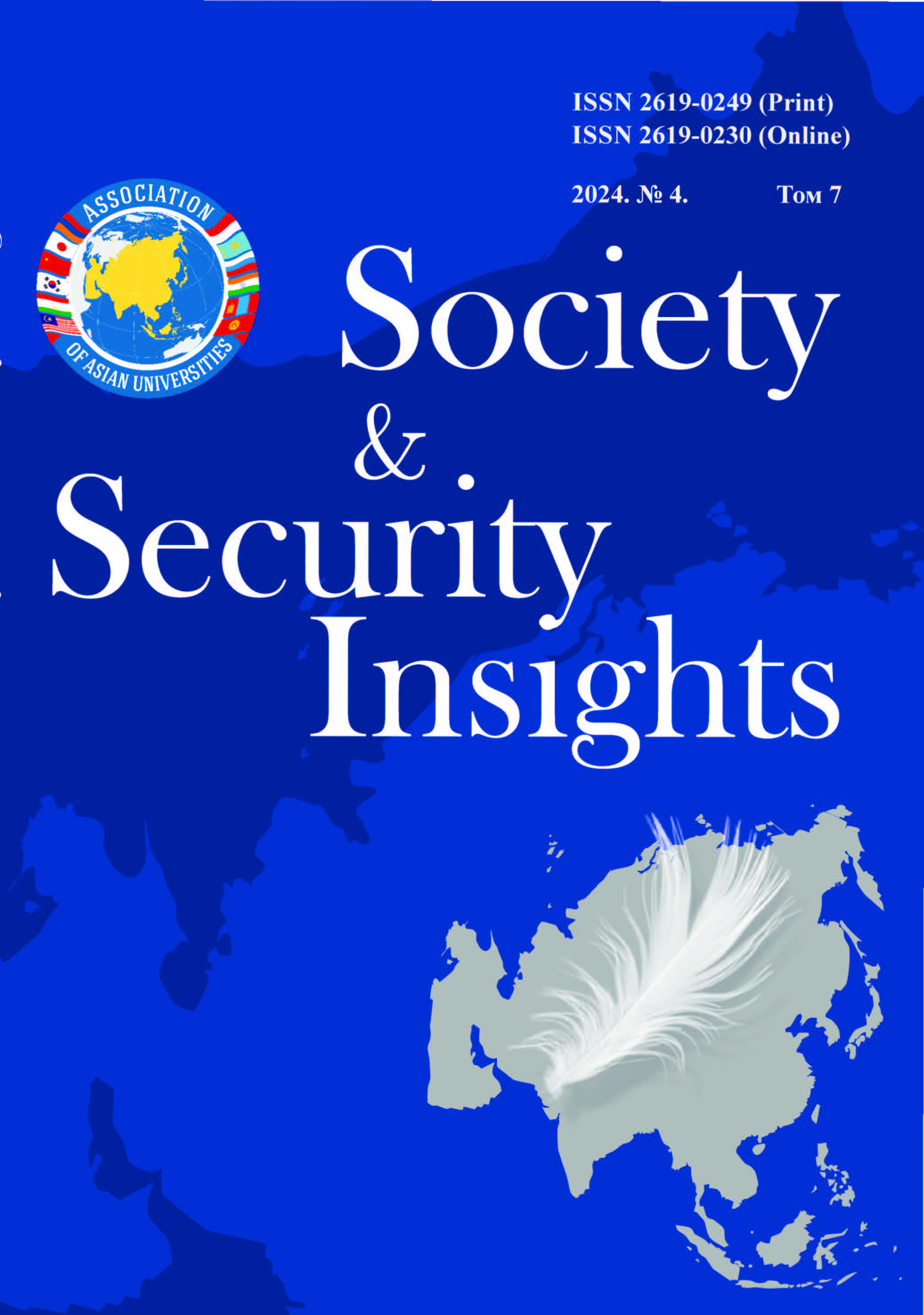ORGANIZATION OF THE EDUCATIONAL PROCESS FOR CHILDREN WITH DISABILITIES IN THE ASSESSMENTS OF PARENTS AND LEGAL REPRESENTATIVES. RESULTS OF A SOCIOLOGICAL RESEARCH
Main Article Content
Abstract
The relevance of this study lies in the fact that, based on empirical data, a picture of the nosological situation in the republic is presented, an assessment of special education is given from the position of one of the actors in the pedagogical process - parents and legal representatives of children with disabilities, an assessment of social factors in the formation of the educational environment is presented, and the main problems of organizing the educational process for children with disabilities are revealed. The purpose of the study is to use sociological methods and an interdisciplinary approach to determine the existing problems of organizing the educational environment for children with disabilities, their relevance, scope and intensity; factors influencing the quality of the educational environment for children with disabilities in schools of the Republic of Bashkortostan. The novelty of the scientific study lies in the fact that the sociological information obtained as a result of a questionnaire survey of parents and legal representatives of children with disabilities is analyzed from the position of the administrative-territorial division of the region, taking into account the type of educational institution and form of education. A sociological analysis of the staffing and demand for the educational process by specialists and teachers of correctional-developmental and psychological-pedagogical support is given. The material presented in the article was prepared within the framework of a sociological study devoted to the issues of forming an educational environment for children with disabilities.
Downloads
Metrics
Article Details

This work is licensed under a Creative Commons Attribution 4.0 International License.
Authors retain the copyright of their manuscripts, and all Open Access articles are distributed under the terms of the Creative Commons Attribution License, which permits unrestricted use, distribution, and reproduction in any medium, provided that the original work is properly cited.
References
Бруцкая К. А., Лазуренко С. Б. Практики включения родителей и прародителей в образование детей с ОВЗ: отечественный и зарубежный опыт инклюзии // Известия РГПУ им. А. И. Герцена. 2022. № 206. С. 133-145.
Варнакова Ю.В. Психологическая помощь семьям, имеющих детей-инвалидов // Современные наукоемкие технологии. 2010. № 8. С. 99-101.
Гимаев И. З. Система образования детей с ограниченными возможностями здоровья как объект научного исследования // Society and Security Insights. 2024. Т. 7, № 2. С. 156–168.
Гимаев И.З., Латыпова М.Х. Оценка удовлетворенности условиями образовательной среды для детей с ОВЗ в школах Республики Башкортостан (результаты социологического исследования) // Уфимский гуманитарный научный форум. 2024. №. 2. С.226–237.
Индикаторы образования: 2023: статистический сборник / Н.В. Бондаренко, Т.А. Варламова, Л.М. Гохберг и др. М.: НИУ ВШЭ. 2023. 432 с.
История образования и педагогической мысли за рубежом и в России: учеб. пособие для студентов вузов / И. Н. Андреева, Т. С. Буторина, З. И. Васильева, Н. В. Кузнецова и др.; Междунар. акад. наук пед. образования; ред. З. И. Васильева. Москва: Academia, 2001. 416 c.
Козырева, О.А. Проблемы инклюзивного образования: учебное пособие для вузов / О. А. Козырева. 2-е изд. М.: Издательство Юрайт, 2024. 179 с.
Ливенцева Н.А. Обзор современных зарубежных исследований по проблемам инклюзивного образования // Психологическая наука и образование. 2011. Том 16. № 3. С. 114–121.
Максимова Н.А. Инклюзивное образование в России: история, состояние и риски // Педагогическое образование в России. 2018. № 9. С. 113-120.
Мастюкова Е. М., Московкина А. Г. Семейное воспитание детей с отклонениями в развитии: Учеб. пособие для студ. высш. учеб. заведений / Под ред. В.И.Селиверстова. – М.: Гуманит. изд. центр ВЛАДОС, 2003. 408 с.
Назарова Н.М. Инклюзивное обучение: историческая динамика и перспективы // Педагогика. 2015. № 9. С. 10-17.
Ратнер Ф. Л. Влияние зарубежных ученых на развитие инклюзивного образования // Вестник ОГУ. 2017. № 10 (210). 138 с.
Ткачева В.В. Семья ребенка с ограниченными возможностями здоровья: диагностика и консультирование. М.: Национальный книжный центр, 2014. 160 с.
REFERENCES
Bokova, O. A., Tarakhov, S. I. (2019). Psychological and pedagogical support of students in the educational environment: modern theoretical prerequisites for research. Mir nauki, kul'tury i obrazovaniya. 5(78), 243-247. (In Russ.).
Brutskaya, K. A., Lazurenko, S. B. (2022). Practices of including parents and grandparents in the education of children with disabilities: domestic and foreign experience of inclusion. Izvestiya RGPU im. A. I. Gertsena. 206, 133-145. (In Russ.).
Varnakova, Yu.V. (2010). Psychological assistance to families with disabled children. Sovremennyye naukoyemkiye tekhnologii. 8, 99-101. (In Russ.).
Gimaev, I. Z. (2024). The education system for children with disabilities as an object of scientific research. Society and Security Insights. 7(2), 156–168. (In Russ.).
Gimaev, I. Z., Latypova, M. Kh. (2024). Assessment of satisfaction with the conditions of the educational environment for children with disabilities in schools of the Republic of Bashkortostan (results of a sociological study). Ufimskiy gumanitarnyy nauchnyy forum. 2, 226-237. (In Russ.).
Bondarenko, N.V., Varlamova, T.A., Gokhberg, L.M. Education indicators: 2023: statistical digest (2023) Moscow: National Research University Higher School of Economics. (In Russ.).
Andreeva, I. N., Butorina, T. S., Vasilyeva, Z. I., Kuznetsova, N. V. (2001). History of education and pedagogical thought abroad and in Russia: a textbook for university students. Moscow: Academia. (In Russ.).
Kozyreva, O.A. (2024). Problems of inclusive education: a textbook for universities. Moscow: Yurait Publishing House. (In Russ.).
Livenceva, N.A. (2011). Review of modern foreign research on the problems of inclusive education. Psikhologicheskaya nauka i obrazovaniye. 16(3), 114–121. (In Russ.).
Maksimova N.A. (2018). Inclusive education in Russia: history, state and risks. Pedagogicheskoye obrazovaniye v Rossii. 9, 113-120. (In Russ.).
Mastyukova, E. M., Moskovkina, A. G. (2003). Family education of children with developmental disabilities: Textbook for students of higher educational institutions. Moscow: Humanitarian publishing center VLADOS. (In Russ.).
Nazarova, N. M. (2017). Inclusive education: historical dynamics and prospects. Pedagogika, 9. 10-17. (In Russ.).
Ratner, F. L. (2017). The influence of foreign scientists on the development of inclusive education. Vestnik OGU, 10(210). 138. (In Russ.).
Tkacheva, V. V. (2014). Family of a child with disabilities: diagnostics and counseling. Moscow: National Book Center. (In Russ.).


 https://orcid.org/0000-0001-6374-5139
https://orcid.org/0000-0001-6374-5139